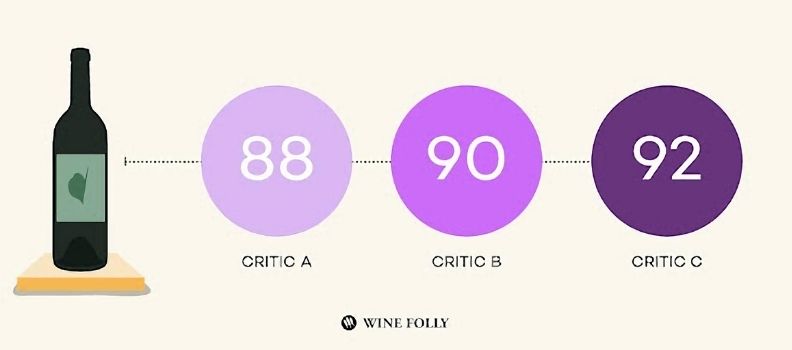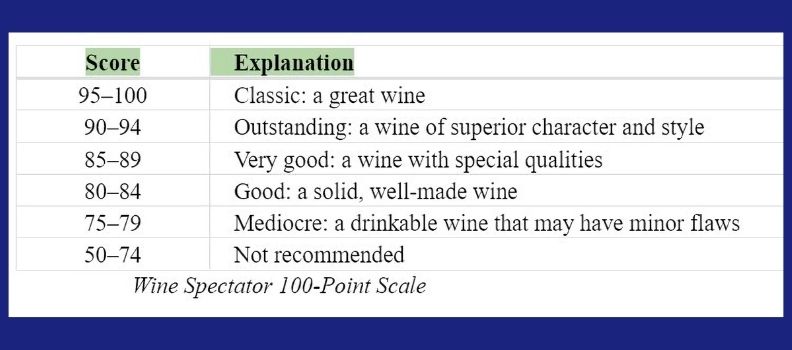
Insights
The Importance of Wine Scores and Why They Still Matter
Wine Direct reports that 77% of online shoppers use reviews and ratings, and 63% are more likely to purchase from a site if it has wine reviews and ratings.
Wine scoring is the most effective tool a professional has to express their opinion about the quality of a wine. Wine scores can help guide wine buyers, producers, consumers on which wines to select and purchase.
We talk of wine scores as a recent phenomenon but scoring systems in the wine world have existed for centuries now. People have been rating vineyards for centuries; The Marquis of Pombal established a system to rate the vineyards used for Port production in the mid 18th Century. In Champagne, all villages are quality rated between 80% to 100%, the lowest is rated between 80% - 89%, the Premier Cru Villages are 90%-99%, and Grand Cru Villages are 100%. We also have the famous Bordeaux Classification of 1855, where chateaus are rated in 5 different categories, and the burgundy Classification, where vineyards are rated in 4 different categories, with Premier Cru and Grand Cru at the top.
Even the practice of rating individual wines has been around for a long time. In Germany, for example, in order to qualify for quality status, it must be tested by a panel of tasters and rated on a 5-point scale; the wine needs at least 1.5 to pass as a basic quality wine.

Since 1978, the 100-point system introduced and popularized by Robert Parker has been regarded as the international standard for rating wines. The quality is scored keeping the wine's color, appearance, aroma, flavors, length of finish, general impression, including the wine's potential in mind. The scale starts at 50 and is used by more and more critics – with each year that passes. This system was so successful that winemakers changed the way they made their wines in order to get a higher score because higher scores were able to fetch higher prices. Additionally, multiple publications or critics that scored wine could provide a platform to lesser-known wineries and offer a wider selection to their consumers.

Users of the 100-point scale include Robert Parker (Wine Advocate), London Wine Competition, USA Spirits Ratings, Wine Spectator, Vinous, Decanter Magazine, James Suckling,), Wine & Spirits Magazine.
The influence of wine scores is evident even now. During my days as a wine rep, a relatively unknown but boutique South African wine that I represented was awarded 92 points. The next day, I was sold out of that wine. The 3-point difference from the last vintage to the current vintage had caused an astonishing surge in demand and price. The importance of these scores cannot be overlooked. A few points can help sell hundreds of more cases and generate thousands of dollars in sales.
The main reason why a point scale system is successful is that it’s simple and easy to understand. Wine is a complicated subject, and it can be challenging to communicate efficiently about its quality. Wine scores from critics coupled with tasting notes and references provide a lot of clarity and help steer away from the confusion of selecting and buying wine. Wine scores are added to websites, merchant catalogs, and wine retail lists to help increase sales.
Wine Direct reports that 77% of online shoppers use reviews and ratings, and 63% are more likely to purchase from a site if it has wine reviews and ratings. Step out of the wine world, and you will notice that all successful subscription websites have a scores and notes model. An industry report conducted by Nielsen in 2020 stated that online sales drive 55% of wine growth in the US, a growing trend that skyrocketed since the pandemic. Wine scores are now playing a more critical role in making choices as more consumers are buying wines from the comfort of their homes, eliminating the human interaction at brick-and-mortar retail stores.
Wine is a booming luxury product whose demand is increasing year on year, and with that, the significance and importance of wine critics and wine scores are also rising. Andrew Mulligan from Convive Wines sums it up nicely "There will always be money to be made in helping people feel more comfortable and confident about the things on which they spend their money."
Written by - Prithvi Nagpal, Editor & Sommelier at Beverage Trade Network
Become a USATT exhibitor and grow your distribution in the USA. Meet importers, distributors, retailers and press. Get exhibitor information here.


